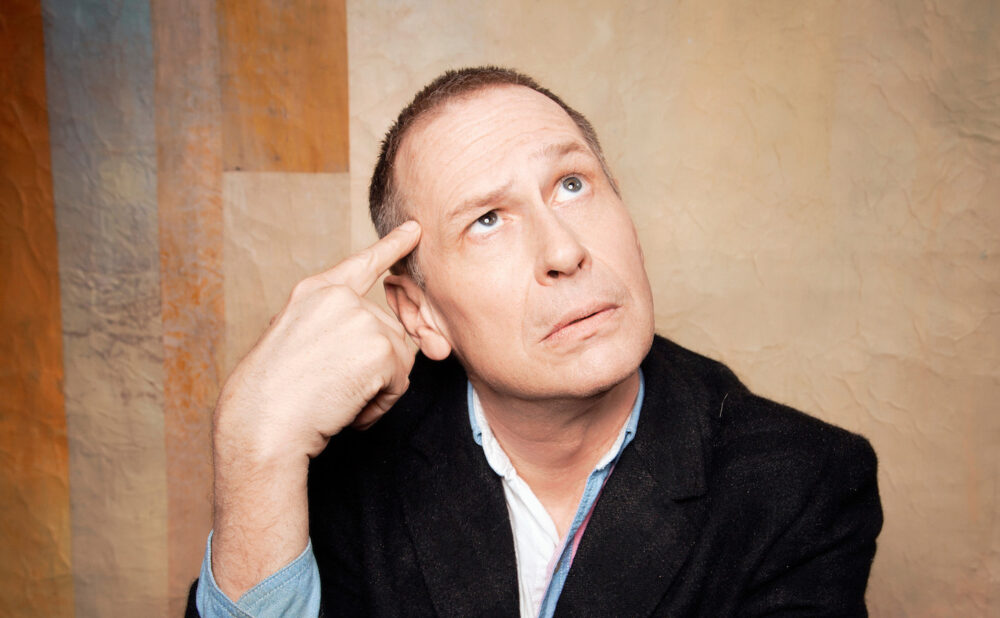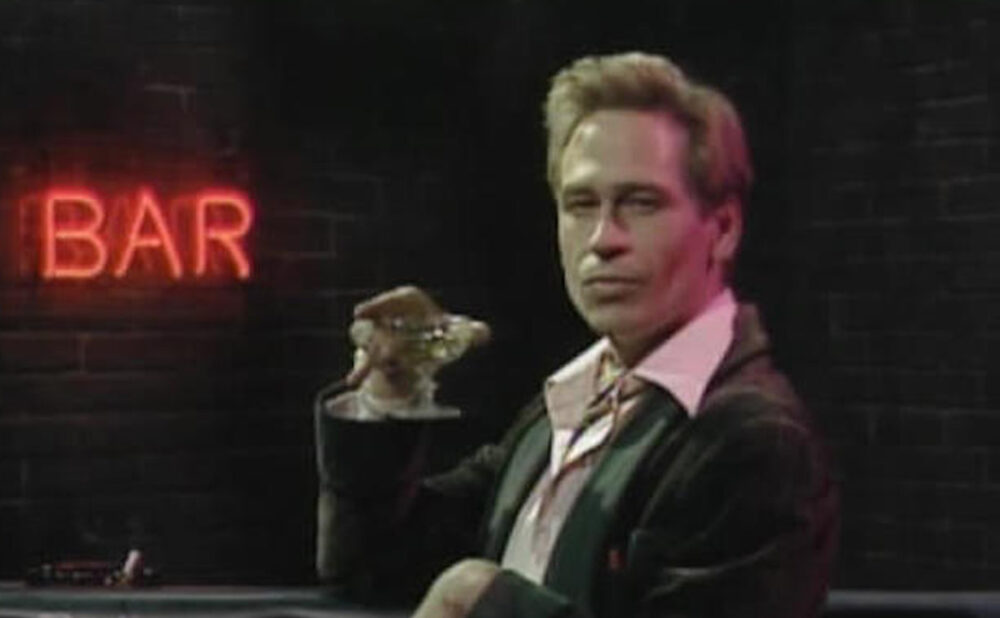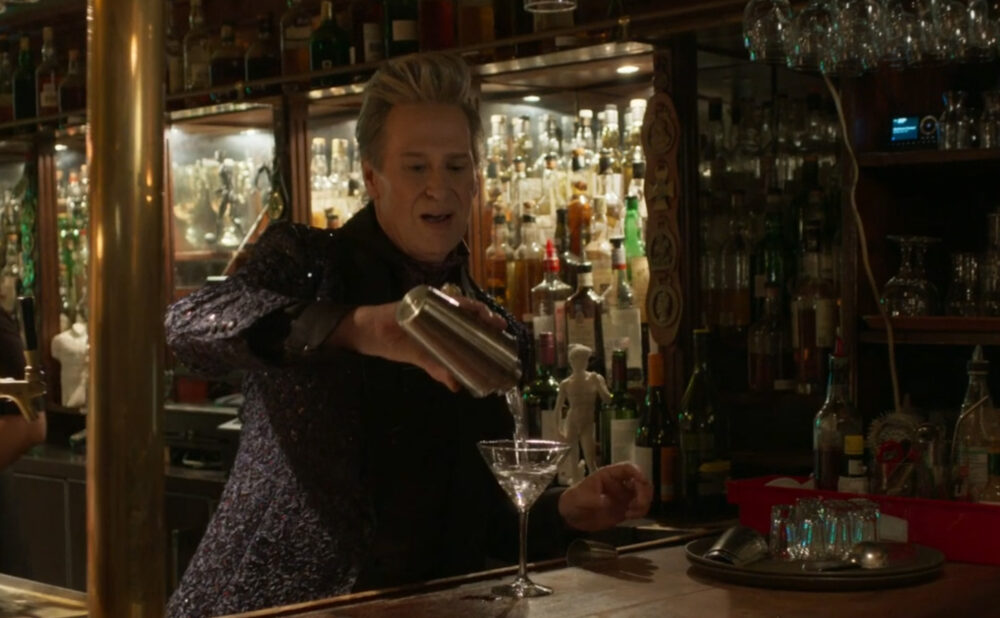Scott Thompson brings Buddy Cole show to Sketchfest with material censored by Amazon
GLAAD told Amazon Prime to cut Buddy Cole monologues from ‘Kids in the Hall’ 2022 reboot
What: Scott Thompson as Buddy Cole in King
When: Thurs, Mar. 7 & Fri. Mar. 8 at 8 pm
Where: The Theatre Centre, 1115 Queen St. W
Why you should go: Scott Thompson brings back LGBTQ+ icon Buddy Cole to perform all the material Amazon Prime censored for Kids in the Hall’s 2022 sixth season revival.
Scott Thompson is bringing his Kids in the Hall Buddy Cole character to the Toronto Sketch Comedy Festival this week and while he’s headlining here, he was almost invisible on a recent Kids revival on streaming.
Anyone familiar with the original run of KITH may have noticed something was missing from Amazon Prime’s Season 6 revival: a Buddy Cole monologue.
Throughout the original five seasons — airing on CBC in Canada and HBO in the U.S. before moving to network television on CBS for the show’s final two seasons — Buddy Cole’s monologues, performed by Thompson and usually set in Buddy’s eponymously-named gay bar, were a staple of the show. Buddy held court at the bar, turning to the camera and delivering monologues laced with sardonic social commentary that Thompson delivered with spellbinding precision.
Which is why it was surprising that Buddy’s only appearance in Amazon Prime’s 2022 revival comes in the second episode, in which Buddy enlists the help of Queen Elizabeth II (another regular character of Thompson’s) to save a talking glory hole from gentrification, in a sketch that features full-frontal male nudity and a cameo by Thompson’s towel-wrapped writing partner Paul Bellini. By the end of the sketch, Buddy is back at the bar. But no monologue.
Thompson says it isn’t because they didn’t shoot one. Amazon Prime cut what they shot. In fact, every single monologue Thompson pitched was rejected by Amazon, which he says happened after consultation with DEI and GLAAD. As Thompson puts it, “They pulled my material to protect people like me from people like me.”
Buddy Cole being controversial is nothing new.
A confident, cool, successful and openly gay character like Buddy Cole appearing on network television in the late ’80s and early ’90s is still, to this day, almost inconceivable. This was a time when the HIV/AIDS epidemic was near its peak in terms of the stigma and discrimination faced by homosexual men.
But there was Buddy Cole on television screens across North America, drinking a cocktail, smoking a cigarette and speaking directly to the camera about how he makes “Canadian” sound sexy. “Americans know as much about Canada,” he says in one of his most quoted monologues, “as straight people do about gays. Americans arrive at the border with skis in July, and straight people think that being gay is just a phase. A very long phase.”
It could be easy to misread Buddy Cole as just another two-dimensional caricature of an effeminate gay man, especially considering the paucity of other LGBTQ+ characters on television at the time. Thompson’s portrayal of a flaming homosexual earned backlash from Toronto’s gay community in the ’80s and ’90s for playing up stereotypes. Wasn’t it obvious, after all, that the audience was laughing at Buddy? His lisp, his hedonism and his effeminacy were all the things for which straight people would ridicule and demean gay men.
But to read the character that way requires ignoring exactly what made him so special: Buddy Cole was fucking cool.
Buddy Cole wasn’t a two-dimensional punching bag for homophobes. He was punk rock. He wasn’t a tragic morality tale or a comedic sidekick for the heterosexual main character. He was the main character. He was, as Thompson puts it to me, a “winner.” He wasn’t being laughed at; he was the one laughing at you. Watching Kids in the Hall on TV while growing up in a small town, I wasn’t laughing at Buddy Cole. I wanted to be Buddy Cole.
That’s why I’m surprised when Thompson tells me the younger generations of comedy fans he meets have never even heard of Buddy Cole. To me, it seems unthinkable that a once iconic gay character has been, according to his creator, largely forgotten by today’s LGBTQ+ counterculture.
That might be about to change, though.
A Buddy Cole documentary is in the works, produced by fellow Kid Bruce McCulloch. The retrospective is being directed by Jessamine Manchester, a young filmmaker and comedian who independently discovered the character and was shocked younger generations of comedy fans had no idea an unapologetic gay man used to appear on network television across North America in the late ’80s and say directly to the audience, “God’s a homophobe, and Satan’s so sexy.”
While the documentary is in production, Thompson has been touring as Buddy Cole in his new live show, King, ending with a triumphant homecoming in Toronto at TOsketchfest on Thurs., March 7 and Fri., March 8.
King is a collection of all that material that Amazon Prime deemed too hot to touch. Thompson was eager to bring that material to live audiences on tour to rub it in Amazon’s nose. As he puts it when we speak over the phone: “The gloves are off.”
Growing up, Buddy Cole was my first encounter with the idea that not only was being gay not something to be ashamed of but it’s actually the coolest thing in the world — that it could make you the coolest and most powerful person in the room.
It depends. Anything can if you approach it correctly. It’s funny that you said that because that was my idea. I didn’t want tolerance. That’s so boring. Tolerance means that people actually don’t approve, but they’re forcing themselves to approve. I didn’t want that. I didn’t want anything that smacked of pity. I don’t see myself as a victim. So yeah, I’m glad; your take on it is exactly the way I wanted it to be.
What is it about Buddy that has made him such an iconic character? Why has he had so much longevity?
Well, I think the truth is always interesting to people. And, obviously, the truth is different to different people, but if someone is actively pursuing what they see as the truth, that never goes out of fashion. That’s who Buddy Cole is. He’s one of those characters that can’t help himself. If he sees something that he thinks is stupid or bizarre or he needs to comment on — even though society may not say he should — he can’t help himself.
I come from a very different time — not like today. When Buddy was coming of age, that kind of a gay man was considered the worst thing a man could be. Buddy’s very cognizant of the fact that most people look at him and see him as weak. I think that’s part of his secret power — that everybody underestimates him. That’s why he will win. He’s a winner. He’s not a clown that approaches things from a fair point of view. He’s always in charge. He’s not a sidekick. He’s not the B-story; he’s always the A-story.
It’s that Buddy is unafraid to tell the truth.
We live in a toxic time — most people are quite afraid to say that. We’re in a very polarized time. And so, whenever that happens, Buddy Cole is always called into service. Someone projected that big “B” into the sky, and he went “Ugh, okay. I guess I gotta go back to work.”
What inspired this show was the difficult experience that the Kids in the Hall had with the Amazon reboot. The experience was so difficult and there was so much censorship that I thought, “I don’t even know how much of a future I have in legacy media because they don’t seem to be able to tackle any of the issues of the day.” I realized no matter what Amazon says no to, you can’t say no to me on stage. So I began with all the material that Amazon wouldn’t allow, because — I don’t know if you’ve seen the [Kids in the Hall] reboot, but there were no Buddy monologues. They weren’t allowed. And so that was, to me, unacceptable, and so I went, “Okay, if war is what you want, then war is what you’ll get.”
I was really surprised when there wasn’t a Buddy Cole monologue in the sixth season.
No, no — we shot one. But they said no. And do you know who said no?
Who?
GLAAD. GLAAD ordered it removed. So, I’m very — I’m going to start talking about what happened: All our material had to be approved by the DEI [Diversity, Equity and Inclusion] and GLAAD. And very little of mine was approved. So, I, when that happened, I went, “Okay. The gloves are off.” They pulled my material to protect people like me from people like me. This is the world we’re in right now.
How surprising is experiencing censorship like that in 2022, considering how ground-breaking the material you were doing 30 years ago was on network TV?
None of it would be allowed today. That’s where we’re at now. The censorship went from one side to the other. It used to be the religious right, but now it’s the secular left. But it’s still the same kinds of people. This is what I’ve realized: no matter how things change, there’s always a certain amount of people — a certain group, no matter what political stripe they are — that are afraid of comedy because the truth threatens everybody in power.
That’s what was interesting with this experience: I’ve been around long enough to see things go from one side to the other. And, in a strange way, that’s kind of liberating. Because I go, “Oh, the middle path is the way” in terms of comedy or satirizing the culture you live in. The only way is in the middle because then you can see all the excesses on both sides.
Sketchfest is the last show on this tour. It’s been very vindicating because I’ve sold out everywhere I go, [receiving] standing ovations. People are ready for this material. I submitted six, maybe seven monologues to Amazon, and not one of them was accepted. And all these pieces are in the show and they’re killing. So, it’s nice to realize you were right and they were so wrong.
Don’t get me wrong, I’m very proud of the show we did. No matter what we’ve done in our career, there’s always been roadblocks, there’s always been censorship. So, we’re used to it.
I also realized roadblocks, in many ways, can be a real boon to creativity. Quite often, when something’s put in your way, when you don’t panic and don’t freak out, you might find a way around it that’s actually more interesting.
Tell me about the importance of having stakes in comedy — of taking risks and telling an audience something they might not necessarily agree with or something they might object to — as opposed to repeating what they already believe, “clapter” comedy, etc.
Oh, “clapter,” isn’t that hideous? There’s not a single moment of “clapter” in this show. And there were some moments when I went, “Oh, they like what I’m saying,” and they’re going, “See, that’s so true,” but they’re not laughing and I would immediately cut it. I don’t want a single moment like that. It has to be very, very funny at all times. I am going into the places that I’m not supposed to, and I know the audience is kind of terrified. I literally go into every single third rail in society today. But, with Buddy, he does it in such a light manner that people don’t even realize they’ve been spanked. They come out of it going, “Well, I really enjoyed that beating.”
How do you feel the reaction in Toronto will be? Do you expect it might be different?
Yes, I do. Yeah, this is a very woke town. Toronto is, you know, pretty uptight. So, we’ll see.
Look, it doesn’t even matter — if I got into some trouble, I couldn’t care less. It’s only going to make things better. If I got some bad publicity, I’d be thrilled.
I’m not going to tell you too much. There is a narrative to the show, but it’s kind of shocking. It makes me laugh, but … you’ll see. If you come to the show, you’ll see. It’s amazing how people respond to it. By the end of the show, I’ve taken people through these landmines and at the end, they kind of go, “Oh, that makes sense.”
It’s exciting to do something really fresh again. I go, “Holy cow, this is wrong. I’m coming out again, in a weird way.”
Would you say there’s an importance to pushing back on the mainstream pink-washing or rainbow-washing, or superficial virtue signalling, towards LGBTQ+ issues?
I was never a mainstream guy. I was never a gay darling, ever. So, this is where I belong. The thing is: I like comedy. I like funny people more than anything. That’s my identity. Nothing else matters.










